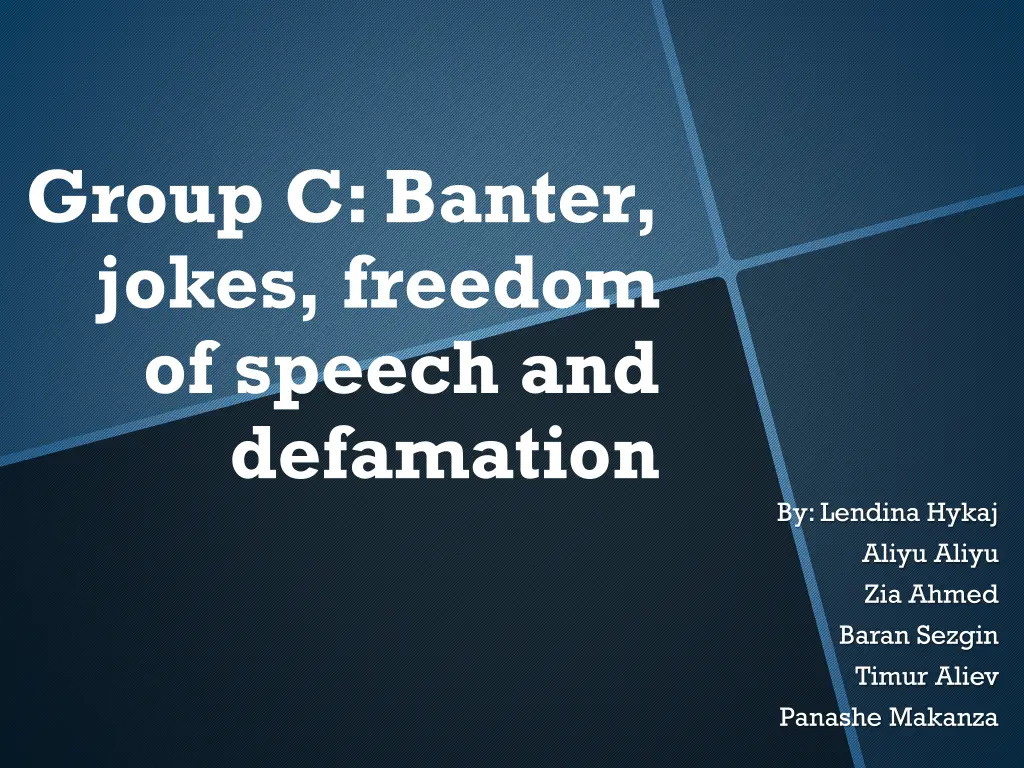
Banter, Jokes, Freedom of Speech, and Defamation Discussion
Explore the concepts of banter, jokes, freedom of speech, and defamation in a group setting, delving into definitions, legal aspects, and implications in online interactions. Understand the nuances of freedom of speech in relation to human rights acts and the balance with defamation laws.
Download Presentation

Please find below an Image/Link to download the presentation.
The content on the website is provided AS IS for your information and personal use only. It may not be sold, licensed, or shared on other websites without obtaining consent from the author. If you encounter any issues during the download, it is possible that the publisher has removed the file from their server.
You are allowed to download the files provided on this website for personal or commercial use, subject to the condition that they are used lawfully. All files are the property of their respective owners.
The content on the website is provided AS IS for your information and personal use only. It may not be sold, licensed, or shared on other websites without obtaining consent from the author.
E N D
Presentation Transcript
Group C: Banter, jokes, freedom of speech and defamation By: Lendina Hykaj Aliyu Aliyu Zia Ahmed Baran Sezgin Timur Aliev Panashe Makanza
Members Panashe Makanza Aliyu Aliyu Lendina Hykaj Zia Ahmed Baran Sezgin Timur Aliev
Presentation Plan Definitions Freedom of Speech Defamation Defamation Law and Internet Service Providers Political Interference Cyber-crime
Definitions Banter: the playful and friendly exchange of teasing remarks. Freedom of Speech: is the political right to communicate one's opinions and ideas using one's body and property to anyone who is willing to receive them. Defamation: is the communication of a false statement that harms the reputation of an individual business, product, group, government, religion, or nation.
Freedom of Speech Humans Right Act: the right to freedom of expression is now expressly guaranteed. It includes the right to hold and express opinions yourself as well as to receive and impart information and ideas to others. It applied not only to information that is favorable but also to those that offend the State or certain people.
Freedom of Speech Everyone has the right to freedom of expression. The right to freedom of expression in Article 10 is not an absolute right. It is a qualified right. However this right is subject to formalities, conditions, restrictions or penalties as are prescribed by law.
Defamation An online threat made by an individual online cannot be pushed ahead with a case unless it carries real menace. Libel is a published false statement, which might damage a person s reputation. Injunctions:the media organisations or social media users can face prosecution for contempt of court. Offensive comments: the punishment varies depending on the comment, EXAMPLES Naming a victim of a sex attack on the internet is an offence Jurors are not allowed to look up information on the internet and go by what they see
Defamation Law and Internet Service Providers Defamation Act 2013: The aim of the Bill is to reform the law of defamation to ensure that a fair balance is struck between the right to freedom of expression and the protection of reputation. ISPs should be held liable for libel if they fail to act after being notified about it. ISPs should be allowed to scrutinise material that is claimed to be libellous before they take action so as to accommodate freedom of expression. There should be a balance between freedom of expression and protection of reputation.
Political interference Political Anger and Patriotism expressed through Hacktivism phenomenon in China The Great Firewall of China Twitter ban in Turkey. Blogger arrests in Russia
Cyber-Crime Firstly, one should consider the main types of cybercrime; Theft Bullying Trespassing Violence Obscenity One needs to understand that the internet has provided criminals with another platform to commit serious crime to a larger number of people all around the world. Social networking has developed an opportunity for online predators to conduct hateful behaviours within the virtual world engaging virtual characters and avatars that provide no specification of the person themselves (for example age, sex etc ).
Distributed Denial of Service oDistributed Denial of Service (DoS) attacks are also an effective means to slow down or shut down a website of an organisation representing a hated group (religious, gay and lesbian websites...) oCyberspace is not simply a medium of direct communication between people who choose to reveal who they are offline.
Thank you for listening! Any questions?
